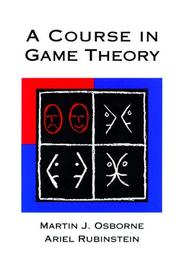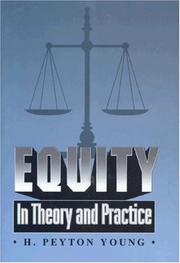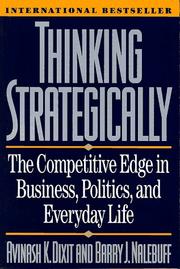| Listing 1 - 10 of 12 | << page >> |
Sort by
|

ISBN: 0198774729 9786612052545 0191525081 1282052543 0198774737 0191596973 9780191525087 9780198774730 9780198774723 9780191596971 9781282052543 6612052546 Year: 1996 Publisher: Oxford ; New York : Oxford University Press,
Abstract | Keywords | Export | Availability | Bookmark
 Loading...
Loading...Choose an application
- Reference Manager
- EndNote
- RefWorks (Direct export to RefWorks)
This textbook for advanced undergraduate and postgraduate students of Evolutionary Game Theory covers recent developments in the field, with an emphasis on economic contexts and applications. It begind with the basic ideas as they originated within the field of theoretical biology and then proceeds to the formulation of a theoretical framework that is suitable for the study of social and economic phenomena from an evolutionary perspective. Core topics include the EvolutionaryStable Strategy (EES) and Replicator Dynamics (RD), deterministic dynamic models, and stochastic perturbations. A set of short appendices presents some of the technical material referred to in the main text.Evolutionary theory is widely viewed as one of the most promising appraoches to understanding bounded rationality, learning, and change in complex social environments. New avenues of research are suggested by Vega-Redondo, and plentiful examples illustrate the theory's potential applications. The recent boom experienced by this discipline makes the book's systematic presentation of its essential contributions vital reading for any newcomer to the field.
Game theory. --- Evolutionary economics. --- Equilibrium (Economics) --- 519.83 --- Theory of games --- 519.83 Theory of games --- Electronic books. -- local. --- Equilibrium (Economics). --- Game theory --- Evolutionary economics --- Business & Economics --- Economic Theory --- Disequilibrium (Economics) --- Economic equilibrium --- General equilibrium (Economics) --- Partial equilibrium (Economics) --- Games, Theory of --- Mathematical models --- Mathematics --- Economics --- DGE (Economics) --- DSGE (Economics) --- Dynamic stochastic general equilibrium (Economics) --- SDGE (Economic theory) --- Statics and dynamics (Social sciences)

ISBN: 0262650401 0262150417 9780262150415 9780262650403 Year: 1994 Publisher: Cambridge: MIT Press,
Abstract | Keywords | Export | Availability | Bookmark
 Loading...
Loading...Choose an application
- Reference Manager
- EndNote
- RefWorks (Direct export to RefWorks)
Operational research. Game theory --- Game theory --- speltheorieën --- #SBIB:303H64 --- 305.6 --- AA / International- internationaal --- 519.83 --- 519.83 Theory of games --- Theory of games --- Games, Theory of --- Mathematical models --- Mathematics --- Speltheorie --- Risicotheorie, speltheorie. Risicokapitaal. Beslissingsmodellen --- Game theory. --- Théorie des jeux --- Game Theory. --- Game Theory

ISBN: 0198520808 0191545503 1280759313 1423753283 9781423753285 9786610759316 6610759316 9780198520801 1383023476 Year: 2005 Publisher: Oxford: Oxford university press,
Abstract | Keywords | Export | Availability | Bookmark
 Loading...
Loading...Choose an application
- Reference Manager
- EndNote
- RefWorks (Direct export to RefWorks)
In this work, which is aimed at researchers in mathematics, physics, and economics, the author describes the mathematical theory of minority games, and focuses on one of three recognised approaches to this phenomenon.
Computer science --- Mathematical physics --- Stock exchanges --- Mathematical models --- 519.2 --- 519.83 --- Bulls and bears --- Commercial corners --- Corners, Commercial --- Equity markets --- Exchanges, Securities --- Exchanges, Stock --- Securities exchanges --- Stock-exchange --- Stock markets --- Capital market --- Efficient market theory --- Speculation --- Mathematical models. --- Probability. Mathematical statistics --- Theory of games --- 519.83 Theory of games --- 519.2 Probability. Mathematical statistics --- E-books --- Finance --- Business & Economics --- Investment & Speculation --- Stock exchanges - Mathematical models

ISBN: 0691091544 1680158961 9786612157196 1400825113 1282157191 140081460X 9781400814602 9781400825110 9781680158960 9781282157194 Year: 2002 Publisher: Princeton, N.J. ; Oxford : Princeton University Press,
Abstract | Keywords | Export | Availability | Bookmark
 Loading...
Loading...Choose an application
- Reference Manager
- EndNote
- RefWorks (Direct export to RefWorks)
Recognizing that robust decision making is vital in risk management, this book provides concepts and algorithms for computing the best decision in view of the worst-case scenario. The main tool used is minimax, which ensures robust policies with guaranteed optimal performance that will improve further if the worst case is not realized. The applications considered are drawn from finance, but the design and algorithms presented are equally applicable to problems of economic policy, engineering design, and other areas of decision making. Critically, worst-case design addresses not only Armageddon-type uncertainty. Indeed, the determination of the worst case becomes nontrivial when faced with numerous--possibly infinite--and reasonably likely rival scenarios. Optimality does not depend on any single scenario but on all the scenarios under consideration. Worst-case optimal decisions provide guaranteed optimal performance for systems operating within the specified scenario range indicating the uncertainty. The noninferiority of minimax solutions--which also offer the possibility of multiple maxima--ensures this optimality. Worst-case design is not intended to necessarily replace expected value optimization when the underlying uncertainty is stochastic. However, wise decision making requires the justification of policies based on expected value optimization in view of the worst-case scenario. Conversely, the cost of the assured performance provided by robust worst-case decision making needs to be evaluated relative to optimal expected values. Written for postgraduate students and researchers engaged in optimization, engineering design, economics, and finance, this book will also be invaluable to practitioners in risk management.
International financial management --- 519.83 --- 681.3*G16 --- Risk management --- -Algorithms --- 658.155 --- Algorism --- Algebra --- Arithmetic --- Insurance --- Management --- Theory of games --- Optimization: constrained optimization; gradient methods; integer programming; least squares methods; linear programming; nonlinear programming (Numericalanalysis) --- Mathematics --- Foundations --- 681.3*G16 Optimization: constrained optimization; gradient methods; integer programming; least squares methods; linear programming; nonlinear programming (Numericalanalysis) --- 519.83 Theory of games --- Risk --- Decision making --- Algorithms. --- Mathematical models. --- Algorithms --- Mathematical models

ISBN: 9780199218462 0199218463 0191551171 1281149772 1435617657 0191776998 9780191551178 9781435617650 9780191579585 0191579580 9786611149772 6611149775 9781281149770 Year: 2007 Volume: 173 Publisher: New York : Oxford University Press,
Abstract | Keywords | Export | Availability | Bookmark
 Loading...
Loading...Choose an application
- Reference Manager
- EndNote
- RefWorks (Direct export to RefWorks)
Games are played everywhere: from economics to evolutionary biology, and from social interactions to online auctions. This title shows how to play such games in a rational way, and how to maximize their outcomes.
Game theory. --- Théorie des jeux --- Game theory --- 519.8 --- 519.83 --- 681.3*I2 --- Operational research --- Theory of games --- Artificial intelligence. AI --- Business. --- Mathematics. --- Business & Economics --- Mathematics --- Physical Sciences & Mathematics --- Algebra --- Economic Theory --- 681.3*I2 Artificial intelligence. AI --- 519.83 Theory of games --- 519.8 Operational research --- Théorie des jeux --- Games, Theory of --- Mathematical models --- Teoría de los juegos --- Libros electrónicos --- Jocs, Teoria de --- Jocs, Teoria dels --- Teoria de jocs --- Matemàtica --- Models matemàtics

ISBN: 0691043191 9780691043197 0691044643 0691214050 9780691044644 Year: 1994 Publisher: Princeton (N.J.) : Princeton university press,
Abstract | Keywords | Export | Availability | Bookmark
 Loading...
Loading...Choose an application
- Reference Manager
- EndNote
- RefWorks (Direct export to RefWorks)
Distributive justice. --- Game theory. --- 330.56 --- 172 --- 519.83 --- Distributive justice --- Game theory --- Games, Theory of --- Theory of games --- Mathematical models --- Mathematics --- Distribution (Economic theory) --- Justice --- Social justice --- Wealth --- Nationaal inkomen. Volksinkomen. Gezinsinkomen. Vermogensstratificatie. Particuliere inkomens en bestedingen. Armoede. Honger --- Sociale ethiek. Sociale moraal. Sociale verantwoordelijkheid --- Moral and ethical aspects --- 519.83 Theory of games --- 172 Sociale ethiek. Sociale moraal. Sociale verantwoordelijkheid --- 330.56 Nationaal inkomen. Volksinkomen. Gezinsinkomen. Vermogensstratificatie. Particuliere inkomens en bestedingen. Armoede. Honger --- Justice distributive --- Théorie des jeux

ISBN: 9027704244 9027704899 9401021619 9789027704894 9789027704245 Year: 1974 Volume: 2 Publisher: Dordrech: Reidel,
Abstract | Keywords | Export | Availability | Bookmark
 Loading...
Loading...Choose an application
- Reference Manager
- EndNote
- RefWorks (Direct export to RefWorks)
Sociological theory building --- Methods in social research (general) --- Operational research. Game theory --- Social conflict --- Game theory --- Conflict management --- Théorie des jeux --- Gestion des conflits --- Mathematical models --- -#SBIB:303H64 --- 330.1 --- 519.83 --- Games, Theory of --- Theory of games --- Mathematics --- Conflict control --- Conflict resolution --- Dispute settlement --- Management of conflict --- Managing conflict --- Management --- Negotiation --- Problem solving --- Crisis management --- Class conflict --- Class struggle --- Conflict, Social --- Social tensions --- Interpersonal conflict --- Social psychology --- Sociology --- Speltheorie --- Economische grondbegrippen. Algemene begrippen in de economie --- Conflict management. --- Game theory. --- Mathematical models. --- 519.83 Theory of games --- 330.1 Economische grondbegrippen. Algemene begrippen in de economie --- Théorie des jeux --- #SBIB:303H64 --- Social conflict - Mathematical models

ISBN: 0691003955 0691043086 9780691003955 9780691043081 Year: 1992 Publisher: Princeton (N.J.): Princeton university press,
Abstract | Keywords | Export | Availability | Bookmark
 Loading...
Loading...Choose an application
- Reference Manager
- EndNote
- RefWorks (Direct export to RefWorks)
This book introduces one of the most powerful tools of modern economics to a wide audience: those who will later construct or consume game-theoretic models. Robert Gibbons addresses scholars in applied fields within economics who want a serious and thorough discussion of game theory but who may have found other works overly abstract. Gibbons emphasizes the economic applications of the theory at least as much as the pure theory itselfformal arguments about abstract games play a minor role. The applications illustrate the process of model building--of translating an informal description of a multi-person decision situation into a formal game-theoretic problem to be analyzed. Also, the variety of applications shows that similar issues arise in different areas of economics, and that the same game-theoretic tools can be applied in each setting. In order to emphasize the broad potential scope of the theory, conventional applications from industrial organization have been largely replaced by applications from labor, macro, and other applied fields in economics. The book covers four classes of games, and four corresponding notions of equilibrium: static games of complete information and Nash equilibrium, dynamic games of complete information and subgame-perfect Nash equilibrium, static games of incomplete information and Bayesian Nash equilibrium, and dynamic games of incomplete information and perfect Bayesian equilibrium.
Operational research. Game theory --- Game theory --- Economics, Mathematical --- Economics --- Mathematical models --- 330.105 --- 519.83 --- mathematische modellen, toegepast op economie --- speltheorieën --- 330.015193 --- -Economic theory --- Political economy --- Social sciences --- Economic man --- Mathematical economics --- Econometrics --- Mathematics --- Games, Theory of --- Theory of games --- Wiskundige economie. Wiskundige methoden in de economie --- Methodology --- Economics, Mathematical. --- Game theory. --- Mathematical models. --- -Wiskundige economie. Wiskundige methoden in de economie --- 519.83 Theory of games --- 330.105 Wiskundige economie. Wiskundige methoden in de economie --- -Economics --- Economic theory --- Economics - Mathematical models --- GAME THEORY --- ECONOMICS --- MATHEMATICAL MODELS

ISBN: 0393310353 0393029239 9780393310351 Year: 1991 Publisher: New York (N.Y.) : Norton,
Abstract | Keywords | Export | Availability | Bookmark
 Loading...
Loading...Choose an application
- Reference Manager
- EndNote
- RefWorks (Direct export to RefWorks)
Strategic planning --- Organizational behavior --- Planification stratégique --- Comportement organisationnel --- Game theory --- Management --- Competition --- Strategic planning. --- 658.4012 --- Goal setting (Strategic planning) --- Planning, Strategic --- Strategic intent (Strategic planning) --- Strategic management --- Planning --- Business planning --- Planification stratégique --- 658.112 --- 519.83 --- #ECO:03.18:industrie en onderneming strategie --- Site, location, place of business --- Theory of games --- 519.83 Theory of games --- 658.112 Site, location, place of business --- AA / International- internationaal --- 650 --- Theorieën en grondbeginselen. Management. --- Business policy --- Theorieën en grondbeginselen. Management --- Concurrence --- Théorie des jeux --- Gestion de l'entreprise

ISBN: 9781402070518 1402070519 9780306481420 0306481421 Year: 2002 Volume: 49 Publisher: Boston: Kluwer Academic Publishers,
Abstract | Keywords | Export | Availability | Bookmark
 Loading...
Loading...Choose an application
- Reference Manager
- EndNote
- RefWorks (Direct export to RefWorks)
Our objectives in writing Project Scheduling: A Research Handbook are threefold: (1) Provide a unified scheme for classifying the numerous project scheduling problems occurring in practice and studied in the literature; (2) Provide a unified and up-to-date treatment of the state-of-the-art procedures developed for their solution; (3) Alert the reader to various important problems that are still in need of considerable research effort. Project Scheduling: A Research Handbook has been divided into four parts. Part I consists of three chapters on the scope and relevance of project scheduling, on the nature of project scheduling, and finally on the introduction of a unified scheme that will be used in subsequent chapters for the identification and classification of the project scheduling problems studied in this book. Part II focuses on the time analysis of project networks. Part III carries the discussion further into the crucial topic of scheduling under scarce resources. Part IV deals with robust scheduling and stochastic scheduling issues. Numerous tables and figures are used throughout the book to enhance the clarity and effectiveness of the discussions. For the interested and motivated reader, the problems at the end of each chapter should be considered as an integral part of the presentation.
Scheduling. --- Production scheduling. --- Project management. --- Emploi du temps --- Ordonnancement (Gestion) --- Gestion de projet --- Scheduling --- Project management --- Production scheduling --- Management --- Business & Economics --- Management Styles & Communication --- 658.513 --- 519.83 --- Academic collection --- 681.3*I28 --- Industrial project management --- Job scheduling (Production control) --- Job-shop scheduling --- Project scheduling (Production control) --- Scheduling (Management) --- Production control --- Time management --- Supervision of production work. Follow-up, progressing, expediting. Scheduling --- Theory of games --- Problem solving, control methods and search: backtracking; dynamic program- ming; graph and tree search strategies; heuristics; plan execution, formationand generation (Artificial intelligence)--See also {681.3*F22} --- 681.3*I28 Problem solving, control methods and search: backtracking; dynamic program- ming; graph and tree search strategies; heuristics; plan execution, formationand generation (Artificial intelligence)--See also {681.3*F22} --- 519.83 Theory of games --- 658.513 Supervision of production work. Follow-up, progressing, expediting. Scheduling
| Listing 1 - 10 of 12 | << page >> |
Sort by
|

 Search
Search Feedback
Feedback About UniCat
About UniCat  Help
Help News
News